
What were EDHEC-Risk Climate’s top 10 most read articles in 2024?
Written on 03 Jan 2025.
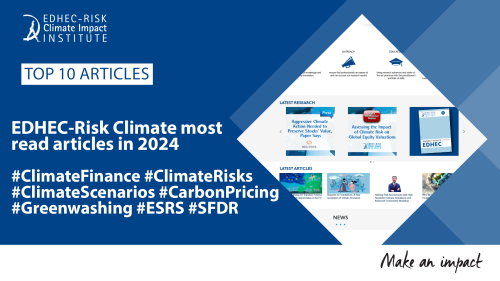
A Year in Research: Focus on Climate and Finance
2024 has been a pivotal year for advancing research at the intersection of climate and finance. At EDHEC-Risk Climate Impact Institute, our work has centered on critical themes such as climate change, climate risks, scenario analysis, double materiality, sustainability reporting, the European Sustainability Reporting Standards (ESRS), the Sustainable Finance Disclosure Regulation (SFDR), carbon pricing, and ESG.
These topics are central to our mission of equipping decision-makers with the tools to navigate the complexities of the transition to a sustainable and resilient economy.
As we enter a 2025, we take a look back at our most-read articles form the past year, covering a diverse range of topics at the heart of our expertise.
#1 How Does Climate Risk Affect Global Equity Valuations? A Novel Approach
This study explores the significant impact of climate risks on global equity valuations, addressing critical gaps in traditional valuation models. Conducted within the research chair established by EDHEC Business School and Scientific Beta, it highlights how uncertainties in climate and economic outcomes, along with state-dependent discounting, can lead to substantial shifts in equity valuations.
The paper examines scenarios where limited climate action results in severe financial consequences, emphasizing the pivotal roles of emission abatement policies, the presence or absence of climate tipping points, and the capacity of central banks to mitigate economic distress. By integrating probabilistic approaches and advanced modeling, the study demonstrates how plausible combinations of climate policies and outcomes could lead to over 40% of global equity value being at risk—rising to over 50% near tipping points.
This work provides crucial insights for investors, urging robust and timely climate action to mitigate downside risks and stabilize financial markets. The findings emphasize the need for innovative valuation approaches that fully account for the interplay of climate risks and economic factors. [Read more]
This publication has been featured in Bloomberg and Reuters.
Authors: Riccardo Rebonato, Scientific Director (EDHEC-Risk Climate) and Professor of Finance (EDHEC Business School), Dherminder Kainth, Former Research Director (EDHEC-Risk Climate), Lionel Melin, CEO (MacroLucid).
#2 Climate Scenario Analysis and Stress Testing for Investors: A Probabilistic Approach
The use of stress testing and scenario analysis is a generally accepted concept in financial risk management. However, climate scenarios are different in two respects: because they cannot be built by ‘resampling’ past history (as we have not encountered yet instances of the climate damages whose effects we want to explore); and because the end users of the scenarios are unlikely to be able to associate them even with very approximate probabilities (again, this is due to the unprecedented nature of climate change in historical times).
In this paper, the authors therefore propose a framework to produce scenarios that reflect the full uncertainty of outcomes, and give an (approximate) assessment of the relative likelihood of their occurrence.
This paper introduces an innovative framework for probabilistic climate scenario analysis and stress testing, tailored to address the unique challenges of assessing climate risks. Traditional financial scenarios, reliant on historical data and precise probabilities, fail to capture the unprecedented nature of climate damages.
The authors propose a method to reflect the full uncertainty of outcomes, offering investors an approximate likelihood of various scenarios. By bridging the gap between financial risk management practices and the distinct requirements of climate risk assessment, the study equips long-term investors with tools to navigate this evolving landscape. [Read more]
Authors: Riccardo Rebonato, Dherminder Kainth, Lionel Melin
#3 On the Triple Illusion of Double Materiality
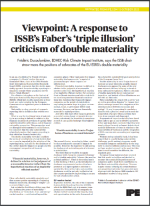
This article challenges existing approaches to double materiality in sustainability reporting, calling for a reassessment of how companies and policymakers address climate impacts. It argues that traditional financial stress-testing frameworks are ill-suited for the uncertainties of climate change, given the lack of historical precedent and reliable data linking temperature changes to economic damages.
The author emphasizes the need for scenario analysis and stress testing to play a pivotal role in preparing for climate risks. Despite the difficulties, they advocate for assigning approximate probabilities to scenarios to guide decision-making effectively. [Read more]
An abstract of this piece, by Frédéric Ducoulombier, Director of EDHEC-Risk Climate, was published by IPE on 13 October under the title A response to ISSB’s Faber’s ‘triple illusion’ criticism of double materiality.
The October 2023 newsletter of the Institute, published on 10 October features a Long Read Interview titled Sustainability Reporting and Material Delusions.
#4 Assessing the RCP / SSP Framework for Financial Decision Making
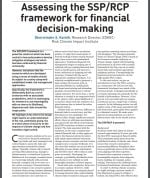
The SSP/RCP framework is widely used for climate modeling but presents challenges for financial decision-making. This article critiques the lack of associated probabilities and highlights how this limitation can mislead investors by underestimating risks. The authors propose integrating robust model risk management practices to enhance the framework’s reliability.
The piece calls for greater scrutiny of scenario design to avoid fostering a false sense of security regarding climate change impacts. It explores how financial decision-makers can better incorporate these scenarios into their strategies to address climate-related risks effectively. [Read more]
This article by Dherminder Kainth, has been originally published in the Investment & Pensions Europe (IPE) and Pensions & Investments (P&I) - special EDHEC Risk Climate supplements.
#5 Greenwashing Regulation

With the growing demand for ESG investments, concerns about greenwashing—the misleading portrayal of investment products as sustainable—are increasingly prevalent in the financial sector. This editorial explores the challenges in defining and regulating sustainable investments, highlighting how broad and inconsistent definitions of ESG contribute to investor confusion and hinder meaningful progress.
The article critiques the lack of standardization in methodologies and objectives across jurisdictions, voluntary standards, and industry practices, which makes it difficult for investors to differentiate between truly impactful strategies and those with limited or questionable sustainability claims. It emphasizes that vague criteria not only undermine trust but also dilute the potential of ESG investments to drive real-world change.
Drawing on the European Union’s experience as a pioneer in sustainable finance regulation, the article reflects on successes and shortcomings in implementing frameworks like the Sustainable Finance Disclosure Regulation (SFDR). It underscores the need for clear, stringent disclosure requirements to protect investors, ensure accountability, and align investment products with genuine sustainability objectives. The piece calls for a concerted effort to enhance transparency and standardization in the ESG space, fostering an environment where sustainable investments can truly deliver on their promise. [Read more]
This editorial by Frédéric Ducoulombier has been originally published in the February newsletter of the Institute.
#6 Portfolio Losses from Climate Damages: A Guide for Long-Term Investors
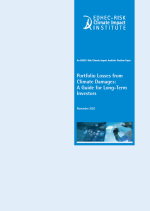
This paper critically examines the advice given to pension trustees on managing climate risks, focusing on the limitations of traditional financial models in addressing the unprecedented challenges posed by climate change. The study highlights how relying on historical data and deterministic assumptions can lead to underestimating the potential impact of climate-related scenarios on investment portfolios.
Engaging with critics who question the adequacy of current approaches, the paper advocates for integrating probabilistic assessments into decision-making processes. Assigning probabilities to climate scenarios allows for a more nuanced understanding of potential outcomes, enabling trustees to better prepare for both moderate and extreme scenarios.
The author warns that without adopting such forward-looking methods, financial markets and consultants risk underestimating the scale and immediacy of climate-related challenges. This could leave pension portfolios exposed to significant vulnerabilities, potentially exacerbating future crises. The study underscores the urgency of rethinking traditional approaches to ensure pension funds are adequately equipped to navigate the risks and opportunities associated with a changing climate. [Learn more]
Author: Riccardo Rebonato
#7 Finance of Transition, Transition of Finance
![[Frédéric Ducoulombier, Director, EDHEC-Risk Climate Impact Institute] T](/sites/ercii/files/images/fd_0_0.png)
This article highlights the critical need to align global financial resources with the urgent goals of climate change mitigation and adaptation. It critiques the financial sector’s prevailing focus on short-term profits, arguing that this mindset impedes the systemic changes necessary to support a low-emission, climate-resilient future. The article underscores that while the required investments are substantial, they are well within the capabilities of global financial systems.
To catalyze this transition, the piece calls on governments to provide clear and consistent regulatory signals that incentivize sustainable investments and foster a supportive policy environment. It emphasizes the role of the financial industry as a key driver of change, leveraging its expertise in risk management, innovation, and resource allocation to act as a steward for global sustainability.
The article makes a compelling case for systemic reform to ensure that financial flows are directed toward decarbonization and resilience efforts. By adopting a long-term perspective, the financial sector has the potential to transform itself into a cornerstone of the global response to climate change, supporting investments that secure a sustainable and livable future for all. [Learn more]
This editorial by Frédéric Ducoulombier was originally published in the July newsletter of the Institute
#8 Internal Carbon Pricing: Impact or Greenwashing?

This paper explores the growing adoption of Internal Carbon Pricing (ICP) as a voluntary method for companies to internalize the social cost of greenhouse gas emissions, even in the absence of external carbon regulations. ICP is increasingly used for risk management, strategic planning, and investment decisions, particularly in sectors with high emissions. However, the paper highlights a critical distinction: while ICP disclosure can enhance corporate reputations, its actual integration into business strategies is the key to reducing carbon footprints.
Using data from the Carbon Disclosure Project (CDP), the study reveals that merely disclosing an ICP is not associated with tangible reductions in emissions. Instead, companies that embed ICP into operational targets or use it to inform decision-making are more likely to achieve meaningful reductions in carbon intensity. This highlights the importance of distinguishing between genuine climate action and potential greenwashing.
The report concludes that ICPs, when properly implemented, can enhance decision-making, improve stakeholder interactions, and align corporate actions with long-term sustainability goals. However, effective integration into strategy—not just disclosure—is essential for ICPs to drive real change. [Learn more]
This article by Gianfranco Gianfrate, Research Director (EDHEC-Risk Climate) and Professor of Finance (EDHEC Business School), has been originally published in the Investment & Pensions Europe (IPE) and Pensions & Investments (P&I) - special EDHEC Risk Climate supplements.
#9 Bridging the Gap: Making Climate Scenarios Fit for Investors
![[Riccardo Rebonato, Scientific Director of EDHEC-Risk Climate]](/sites/ercii/files/images/rr_portrait_long_2024_3_0.jpg)
The foundational white paper by EDHEC-Risk Climate Impact Institute explores how to adapt the IPCC framework for financial decision-makers by introducing probabilistic data and practical enhancements. While existing IPCC scenarios provide valuable insights, they lack crucial elements such as probability estimates and a range of economic assumptions, limiting their use in financial planning.
This article presents a two-fold approach. The first strand stays close to the IPCC methodology but adds probabilistic dimensions to climate outcomes, making them more relevant for finance professionals. The second strand takes a bold departure, employing empirical analysis to derive relationships between economic, demographic, and technological variables, enabling a deeper understanding of climate outcomes and associated risks.
The resulting framework offers financial decision-makers conditional and unconditional distributions of climate outcomes, such as temperature changes, economic damages, and cash flow impairments. This approach equips practitioners with actionable insights to manage climate-related risks, address uncertainties, and refine investment strategies. [Learn more]
This article by Riccardo Rebonato has been originally published in the February newsletter of the Institute.
#10 Scope for Divergence - A review of the importance of value chain emissions, the state of disclosure, estimation and modelling issues, and recommendations for companies, investors, and standard setters
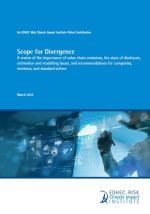
This policy report explores the challenges of reporting greenhouse gas emissions throughout value chains, with a particular focus on Scope 3 emissions, which typically represent the largest share of a company’s carbon footprint. It examines how different jurisdictions address these challenges, contrasting the EU’s proactive leadership in mandating corporate reporting with the US's resistance, citing concerns over feasibility, cost, and data reliability.
The report underscores the EU's integration of value chain emissions into its climate benchmarks as a forward-thinking approach, demonstrating that transparent reporting can be implemented effectively without the catastrophic impacts predicted by some opponents. Meanwhile, the lack of similar mandates in the US leaves significant gaps in accountability and poses risks to global alignment on climate goals.
The findings stress the importance of standardized, comprehensive disclosures to enhance the ability of investors and regulators to assess climate risks accurately. Transparent reporting enables better capital allocation, supports informed decision-making, and fosters collective progress toward decarbonization. By addressing data gaps and inconsistencies, the report outlines practical steps for improving reporting frameworks, ensuring that emissions accountability contributes meaningfully to global climate action. [Learn more]
Author: Frédéric Ducoulombier
Stay tuned to our website to be informed on EDHEC-Risk Climate Impact Institute future research.
To subscribe to our complimentary newsletter, contact us at: [email protected].

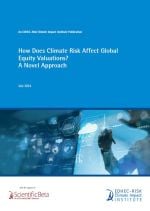
![[A blue cover with text and a person writing on a glass board Description automatically generated]](/sites/ercii/files/images/stresstestwpjan24_0.jpg)
